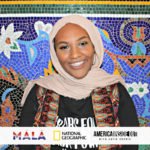To spotlight and amplify Muslim American voices, join MALA’s campaign to elevate public dialogue on Muslim-American identity in the 21st Century. In the spirit of this inspiring episode and series, share your story with us: what is it really like to be Muslim in America? Selected stories are shared by MALA and National Geographic.
Being a young woman who happens to be of an African-American descent and of the Muslim faith, I feel that I incorporate diversity on a daily basis of life. The fact that I am able to go ahead and pray in my local mosque in Richardson, Texas, and also volunteer in the Ethiopian community center within the same day speaks volumes about the cultural diversity within America. I believe that this has helped enhance my public speaking skills in this day and age, which is important to me because people often think that Muslim women are deprived of a public voice.
During my time at in high school I was able to cultivate myself, and I served as a President of Youth and Government. I was part of the Legislative department, which focused on creating a Refugee Act to allow an increased of number of international refugees entering the United States. This Act is currently in process and is very important because, at the end of the day, everybody needs a place that they can call home. We are all people at the end of the day, regardless of religion or race.
Furthermore, I implemented a Resettlement Act that is currently in the process of providing basic necessities for refugees, such as food, clothes, and school supplies. As the lead of my humanitarian club in high school, I established drives for refugee needs. Because it’s not easy to leave your way of life suddenly and come to another country overseas, I created a Public Service Announcement video, and along with it a booklet (which will be available in all languages) to help refugees assimilate American culture into their daily lives. Finally, I worked as an Intern at the Refugee Center of North Texas and I was able to assist with teaching English and tutoring children, who were mostly elementary-school aged.
I feel like this is so important because communication skills are vital to having a voice in our society. I strongly embraces multi-culturalism and diversity—and I feel like I am already living these core values that are essential to humanitarian leadership within our world. I have the potential to become a future leader in our world and to create a path that will lead me to success. I want to change the global perception in the media that Muslims and African Americans are oppressed, depressed, and repressed in society when it comes to having a voice.
In life, I have learned that it only takes one person to change the world.


